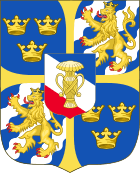Gustav of Sweden (1568–1607)
_%26_2_royal_pages_of_hers..jpg)
| Swedish Royalty |
| House of Vasa |
|---|
 |
| Gustav I |
|
| Eric XIV |
| John III |
| Sigismund |
| Charles IX |
|
| Gustav II Adolf |
|
| Christina |
Gustav (January 28, 1568 – February, 1607) was a Swedish prince,[1] the son of Eric XIV and Karin Månsdotter.
The infant Gustav was present at his mother's wedding to the King of Sweden in 1568 and at her coronation, together with his sister Sigrid. The presence of the children was a way to demonstrate their new status: both of them were officially confirmed as legitimate, and Gustav and his sister were given all the privileges of a royal prince and princess.
After his father's dethronement, Gustav was sent to live outside of Sweden in 1575, to protect him from King John III who feared that the supporters of Eric would try to deprive his son of the crown. Gustav came to Poland where he lived in poverty and despair. At some time during his stay he became a Catholic.
Ivan IV of Russia attempted to persuade Gustav to help him in his political ambitions around the Baltic, but these attempts (which included both promises and several years exile) failed.
In August 1599 Gustav arrived in Moscow for a proposed marriage to the Tsar Boris Godunov's daughter Ksenia. But there, he lived a self-indulgent life. As a consequence, he invited his old lover Brita and their children to stay in his Russian home, and showing them in public in a carriage harnessed as though it was meant for the tsarina. As a result, the Tsar eventually broke off the engagement of his beloved daughter.
As compensation, the homeless Gustav received the principality of Uglich, where he lived until the beginning of the reign of the False Dmitry, who ordered his arrest by the demands of his ally — Sigismund III Vasa (cousin of Gustav and son of King John III) and sent him to Yaroslavl jail. After the death of the False Dmitry, the new tsar, Vasili IV of Russia, released Gustav and sent him to live in the small city of Kashin, Russia.
Gustav Eriksson Vasa died in February 1607 in Kashin and was buried there February 22. He was in elder history writing thought to have had four children with a certain Brita Karth and perhaps even have married her.[2] This has however been refuted by modern historians.[3]
Gustav is the main character of the famous Polish novel "Gwiazda spadająca" by Jadwiga Żylińska.
References
- ↑ Bonniers konversationslexikon Stockholm 1949 p 311-312
- ↑ The alleged story of Brita Karth in Wilhemina Stålberg & P.G. Berg Anteckningar om svenska qvinnor (Stockholm 1864-66)
- ↑ See for example Bengt Hildebrands article "Eldstierna" in Svenskt biografiskt lexikon, vol. XIII (Stockholm 1950) and Ulf Sundberg: Kungliga släktband (Lund 2004)